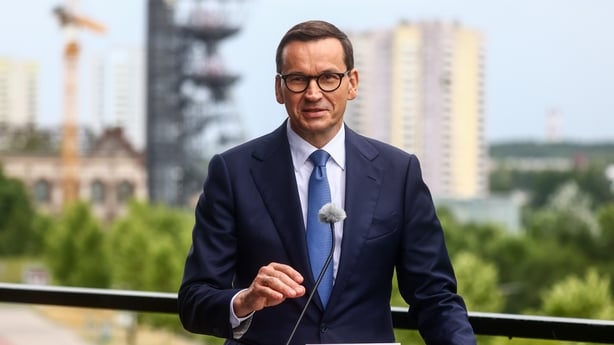The Polish cabinet has decided to ban Ukrainian grain imports beyond 15 September, if the European Commission decides against extending an existing ban.
In May, the Commission agreed to allow five eastern EU member states - Poland, Slovakia, Hungary, Bulgaria and Romania - to temporarily stop imports of Ukrainian grain, following protests from farmer unions in their countries.
The ban on grain imports, which covers wheat, maize and sunflower seeds, expires on Friday.
Poland and the four other countries want the ban to be extended until the end of the year.
Since May, Ukrainian grain has continued to transit via the five member states for export elsewhere.
Speaking at a press conference in Warsaw, Mr Morawiecki said that "regardless of the EU's decision, we will extend the embargo".
In a video released on X, formerly Twitter, he emphasised Poland’s strong support for Ukraine, but said that only his Law and Justice party could "guarantee that the interests of Polish farmers could be protected".
"Poland will not allow Ukrainian grain to flood us. Regardless of what Brussels officials decide, we will not open our borders," read the prime minister's post.
Poland is due to hold parliamentary and senate elections on 15 October, and the ruling right-wing Law and Justice party has gained strong support in rural areas in the past two parliamentary elections.

The gradual collapse of the Black Sea Grain Initiative in the months leading up to July, a Turkish and UN-brokered deal between Russia and Ukraine to transit grain via the Bosphorus Strait, caused a surge of Ukrainian grain to enter eastern EU member states - the only viable export route open to Kyiv.
Logistical problems caused large volumes of cheaper Ukrainian grain to remain in Poland, entering the local market and reducing domestic prices, cutting farmers’ profits.
That led to mounting protests from Polish farmer associations earlier this year.
Similar protests by farmers took place in Romania.
In May, 12 EU countries, including Ireland, voiced concerns about the temporary ban in a joint letter to the Commission, stating that other member states had not been consulted about the decision.
Poland’s strong support for Ukraine after Russia’s invasion last year and its accommodation of more than one million Ukrainian refugees led to good relations between Warsaw and Kyiv.
But the grain ban has strained those good ties.
In July, Ukraine's Prime Minister Denys Shmyhal labelled Poland's plan to extend the ban as "unfriendly".
Ukraine has asked the Commission not to extend the ban and, last week, the country’s deputy minister for economy Taras Kachka said, in an interview with Politico, that his country would file a complaint with the World Trade Organisation against the EU if the ban continues.







